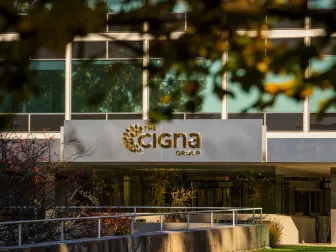January 30, 2025

(Bloomberg) -- Cigna Group shares slumped after the health insurer reported its fourth quarter was hit by surprisingly high costs from plans employers use to cover catastrophic medical claims.
The shares slid as much as 10% when markets opened in New York, their biggest intraday loss since November 2022. The drop wiped out Cigna’s gain of 9.8% this year through Wednesday’s close.
The report fueled investors’ fears of out-of-control medical costs industrywide after UnitedHealth also reported surprise jumps. Cigna’s insurance business, which focuses on private health plans, was thought to be less exposed to the expenses that Medicare and Medicaid health plans have seen in recent quarters.
Cigna’s health benefits segment spent 87.9% of premium revenue on medical expenses in the fourth quarter, more than analysts were expecting. The insurer blamed those costs on “stop loss” plans, coverage that some employers buy to limit losses from particularly expensive claims.
“We had a greater frequency of high dollar claimants than we had been expecting,” Cigna Chief Financial Officer Brian Evanko said on a call with investors, pointing to costs of surgeries and cancer drugs.
Cigna said the high costs will weigh on margins for the next two years. The company forecast spending 83.2% to 84.2% of 2025 premium revenue on medical costs, compared with the average estimate of 81.8%. Investors prefer a lower number.
Adjusted income from operations was $6.64 a share in the three months ended Dec. 31, lower than the average estimate. Profit in 2025 will be at least $29.50 a share, Cigna said. That’s also below the average analyst estimate of $31.50 compiled by Bloomberg.
These results are “likely to get the most attention today given solid recent performance of Cigna shares,” Mizuho’s Jared Holz said in a note. The forecast looks “more conservative than not but need to see how this shakes out.”
The insurer also operates a top pharmacy benefits manager, which negotiates drug prices between manufacturers, insurers, and pharmacies. The drug middlemen have been under fire from some Washington lawmakers and regulators who say that PBMs elevate drug costs.
(Updates with opening shares, company comments starting in second paragraph.)